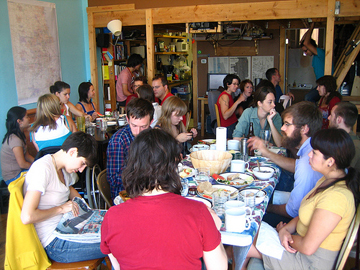
Sunday Soup at InCUBATE
In the current state of financial precariousness, artists and arts administrators need to build mutually beneficial trust economies and supportive networks to rally for funding. And with arts institutions and nonprofits closing their doors and liquidating their collections in hoards, the need to demonstrate why art should be valued seems particularly vital now. However, InCUBATE, a research institute based out of Chicago that critically interrogates current models for arts funding, asks whether a revaluation of art is really what is needed.
“It’s weird to frame the question like: why is art valuable? Versus why is science valuable? Or why are the humanities valuable?” says Abigail Satinsky, who founded InCUBATE along with Roman Petruniak and Ben Schaafsma in 2007.
“If we set up the conversation all the time about how things need to be justified in economic terms then we’re running up against a fundamental problem,” Satinksy continues. “It’s important to start from the opposite end of things, and not just demand that money be thrown at whatever you think is interesting. You should figure out why it exists, who you want it to exist for, and what resources you need to make it happen and build it up. I could go off about how I think art provides us with unique ways of looking at the world, but then I would just be reinforcing the question.”
InCUBATE, which stands for the Institute of Community Understanding Between Art and the Everyday, is currently run by Satinsky, Petruniak, Bryce Dwyer, and Matthew Joynt. The group is more of a platform for asking questions than a tangible collective, although they have a space in Chicago where they present programming, an artist residency, and a regular monthly brunch where funds raised are granted out to an artist or project.
The brunch, which began as a weekly program called Sunday Soup, was initiated to streamline the process of applying for artist grants. The process is participatory, with brunch patrons voting on which project receives the grant. These are only micro-grants—never more than $200-300 at a time—but for individuals for whom the bureaucracy of grantwriting is impossible to comprehend, every little bit helps. InCUBATE has taken Sunday Soup on the road, from Creative Time’s Democracy in America exhibition to SKYDIVE, a contemporary art space in Houston. In its various incarnations, Sunday Soup is a grantmaking resource, a platform for discussion, and an art project in its own right.
The problem of sustainability is one at which InCUBATE balks. The members are explicit about the fact that they are asking these questions for themselves, and that any sense or manifestation of community that comes from it is is a bonus. “Success is often gauged by the fact that we get ‘cushy’ jobs and that we can support ourselves out of it,” says Satinsky. “We made this choice, but we also have the economic realities of our daily lives like everybody else does, and this is enriching in other ways. I don’t think [InCUBATE] should be gauged as successful by whether or not it’s a functioning institution. As soon as this becomes un-interesting to us, we’re going to stop. That’s the freedom you’re allowed by doing a project that’s for yourself. I don’t think it’s about building something that is a replicable model.”
Instead of asking how we can come up with a sustainable model for arts funding, InCUBATE asks the opposite. They want, first of all, to question why we value sustainability, whether some projects are meant to endure, and what it means to be successful as an artist or organization. The group is currently working on a project called Artist-Run Credit League, where they are asking artist spaces local to Chicago to pay into a monthly “pot.” The idea is that these spaces will throw fundraisers, the money from which gets paid into a collective account. Each month, the same spaces receive payouts, hopefully with interest if fundraisers are successful.
“We were interested in the idea that a lot of apartment galleries in Chicago are not actually organizations, are not incorporated as nonprofits, and actually don’t have plans to be in operation for a while,” explains Satinsky. “So we were trying to figure out a flexible banking structure that would be helpful to those organizations versus all the granting opportunities being geared at nonprofit organizations with five-year plans.” While this might only benefit short-term projects or spaces that will likely disappear in a year or two, InCUBATE is building a workable network of mutual support.
InCUBATE proceeds by framing questions to identify ways of being in institutions. From these questions arise key principles that can be tested in practice. These are not unbendable or categorical imperatives; rather they are modes of operating within systems in order to continue learning, growing, and having new conversations. This, notes Satinsky, is why she and her colleagues asked these questions in the first place. “If we think of InCUBATE as a really good learning tool, in terms of figuring out how the system works and how we want to operate within it, then we can go out and get jobs and implement our values and see how they work on a much larger scale than what we’re able to do. And there’s nothing wrong with that. It’s not about being oppositional; its about figuring out how the system works.”




Pingback: Friday Clips 4/24/09 : Bad at Sports
Pingback: Experimental Economies: Talking with Chicago’s InCUBATE «
Pingback: InCUBATE on the internet « InCUBATE
Pingback: InCUBATE on the Internet « Incublog
Pingback: New guest blogger: Bryce Dwyer | Art21 Blog
Pingback: Concentrating on the Social in Portland | Art21 Blog
Pingback: Recap: Creative Time Summit, Saturday October 9th, 2010 | Art21 Blog
Pingback: Open Enrollment: Coffee and Politics (Part 1) | Art21 Blog